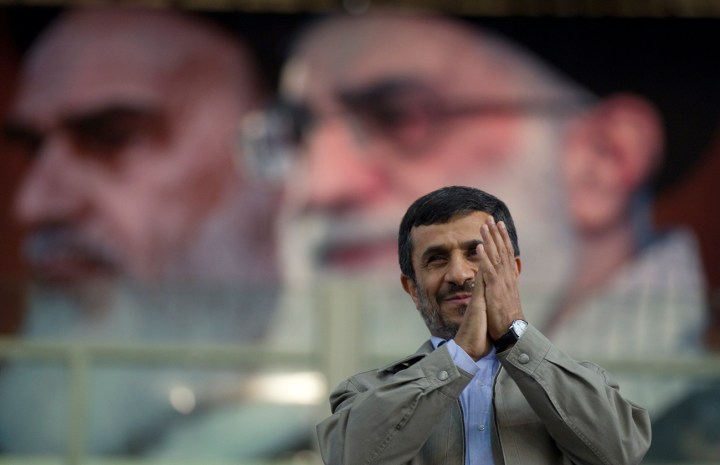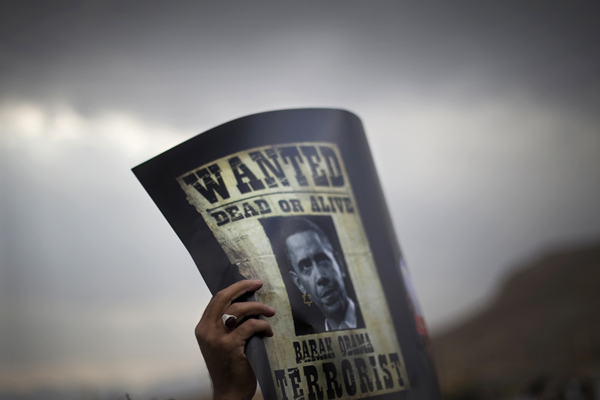Politics
US, Iran & the ever-closer conflict

The latest version of this Iranian-US confrontation has become virtually the only front-burner foreign policy issue in this year’s presidential election – at least as far as the Republican candidates in the political party primaries are concerned. The Iranians, the Israelis and the Americans must all be contemplating the uncertainties that would inevitably spin out of control from any sort of precipitate action. By J BROOKS SPECTOR.
An old hand at diplomatic work and life, and a man who was this writer’s mentor several decades ago, was a diplomat who had fallen under the spell of Iran, after he had been assigned there several times during his career. (Late in life he would marry a vivacious, well-educated, professional Iranian woman as well.) Late one night, while we were trying to solve all the world’s problems over a glass of whiskey, we got on to the topic of Iran. This was at a time when that country was embroiled in its brutal decade of war with Saddam Hussein’s Iraq – well after the Iranian Islamic revolution had supplanted the student-led rebellion that had first ousted the Shah Reza Pahlavi.
My friend insisted that it was crucial to bear in mind that the Iranians (and thus their Persian forebears) were an intensely proud people – deeply aware of and animated by two great traditions – a Persian civilisation that had outlasted Babylonia, Rome and Byzantium, and then a newer layer of militant Islamic civilisation on top of it. Iranians might have been mired in deep turmoil in the 1980s as a society and as a nation, but with their well-educated, energetic population and the country’s enormous resource base of natural gas and petroleum, my friend insisted Iran would be a key international player in the 21st century.
In fact, for the past half century and more, the US and Iran have been locked in an embrace marked by America’s support for the last shah (and his father); US involvement in the overthrow of Iran’s left-leaning populist political leader, Mohammad Mossadegh, in 1953; the violent occupation of the US Embassy in Tehran and the subsequent hostage taking of embassy staff in 1980 – and American assistance to Iraq during the Iraq-Iran war that came afterwards. The confrontation between Iran and the US could perhaps be described as an inevitable clash between two competing Weltanschauungs – and very different American and Iranian social and political “exceptionalisms”.
More recently, this has been exacerbated further by the clash between an almost certain Iranian desire to join the nuclear club and American intentions to thwart that development, as well as – from the Iranian perspective – the effective encirclement of Iran that has come from the American military involvement in Afghanistan, Iraq – and its close (but troubled) connection with Pakistan as part of this. In turn, successive American administrations have seen Iran – often explicitly – as part of a group of nations and non-state actors – like Syria, North Korea and the radical Islamic movement, Hezbollah – that have been colluding in efforts to build (or use, in the case of Hezbollah) missiles and develop weapons grade fissile materials for nuclear devices.
Now, the newest version of this Iranian-US confrontation has become virtually the only front-burner foreign policy issue in this year’s presidential election – at least as far as the Republican candidates in the political party primaries are concerned. But, given the concern the Obama administration has attached to its belief Iran is reaching for nuclear weapons capabilities, in the absence of any other obvious point of attack on the Obama administration’s national security posture and position, Iran has effectively taken the place previously served by the military challenge of the Soviet Union throughout the cold war, China during the Korean War and China and Japan’s respective economic challenges from the 1980s onwards. Typical of this is candidate Mitt Romney’s insistence “If we re-elect Barack Obama, Iran will have a nuclear weapon… If you elect me as president, Iran will not have a nuclear weapon.” Other candidates such as Newt Gingrich and Rick Santorum have publicly (and rather problematically) advocated using covert operations to bring things to a halt inside Iran if there is any further progress in nuclearisation.
Concurrently, Iran is also gearing up for its own election for that country’s parliament, or majlis, in March. In this election, President Mahmood Ahmedinejah’s supporters are challenged by a block of parties even more supportive of direct theocratic rule than under the current regime. It should also be recalled that Iran was the site for numerous demonstrations by large gatherings advocating less religious involvement with society and law within the past year. Iranian society clearly is divided by unresolved tensions over the role of religion and the ayatollahs in society. Even more problematically still, some Republican candidates have been advocating direct intervention on behalf of secular civil society groups to thwart the power of the ayatollahs as well.
Historically, throughout the Pahlavi years, as a non-Arab Muslim nation, Iran had been allied with the Israeli state, paralleling Israel’s relationship with also a Muslim, non-Arab Turkey. However, Iran made a 180-degree change in orientation, once Iran became a theocratic state in 1979. They ended oil sales to Israel and ramped up support to armed Palestinian insurgent groups like Hezbollah, operating in Lebanon’s border region.

Photo: An Iranian student holds up an anti-U.S. poster as he attends a demonstration to show his support for Iran’s nuclear program, before a ceremony to form a human chain around the Uranium Conversion Facility (UCF), in Isfahan, 450 km (280 miles) south of Tehran, November 15, 2011. REUTERS/Morteza Nikoubazl
From the time he was elected, Obama made the advancement of comprehensive international nuclear non-proliferation agreements a cornerstone of his administration’s foreign policy. It hosted a major international conference on this theme and it has continued to use a range of other diplomatic avenues – usually in combination with key allies and via elements of the UN – to rein in Iranian, North Korean and Syrian nuclear ambitions. Most recently it has been implementing sanctions on the Iranian banking sector, for example, to make it more difficult to process international payments for petroleum sales and by getting its usual customers to stop buying any Iranian oil at all – all with an eye towards upping the pressure on Iran to come to the table on nuclear issues.
So far, at least, these efforts have been less than overwhelmingly successful in reaching a satisfactory (at least to the US) resolution over Iranian nuclear moves. Moreover, this effort is complicated by the fact that, to date, Iran has publicly denied it is trying to produce nuclear weapons in any case. In response to these moves by the US, however, Iran has repeatedly threatened to close the ultra-strategic Strait of Hormuz that links the Persian Gulf with the Indian Ocean and the major international routes for the petroleum trade. This narrow, busy maritime passage – about 50km across at its narrowest point – is one of the world’s most important economic chokeholds. Virtually all of the natural gas and petroleum exports of Saudi Arabia, Kuwait, Iraq, the smaller Persian Gulf states and Iran flow through these waters to worldwide markets.
Restricting such movement, or just creating uncertainties in this flow, would have major repercussions for consumer nations and global petroleum prices. Moreover, should Iran actually attempt to block the Strait, it would not be a stretch under international law to assert that such an action was a belligerent act that justified international military action in response. Not a stretch of imagination when considered that 16-million barrels of oil — about a fifth of the world’s daily oil trade — flow through the Straits every day.
Noting the strategic importance of this waterway, Adm. Jonathan W. Greenert, the chief of naval operations, said “If you ask me what keeps me awake at night, it’s the Strait of Hormuz and the business going on in the Arabian Gulf.” Looking at the Iranian side, veteran Middle East policy advisor to several presidents, Dennis Ross, noted that if the Iranians actually tried to close the Strait, “They would basically be taking a vow of poverty with themselves. “I don’t think they’re in such a mood of self sacrifice.” But no one is actually 100% certain, of course.
Observers of Iranian military capabilities add yet another wrinkle to this potential tinderbox. Iran effectively has two naval forces; the first is a more conventionally organised one with larger vessels like corvettes and destroyers. The second, however, is part of Revolutionary Guard structures, using smaller, fast patrol craft. The problem is that analysts argue that command and control systems are less rigorous with the second set of forces and some worry that individual commanders of some patrol boats might well take matters into their own hands and begin to stop or board tankers in the Persian Gulf and Strait of Hormuz – setting off an inevitable and unpredictable escalation of hostilities.

Photo: John Bumgarner, a cyber warfare expert who is chief technology officer of the U.S. Cyber Consequences Unit, a non-profit group that studies the impact of cyber threats, poses for a portrait in Charlotte, North Carolina December 1, 2011. A cyber warfare expert claims he has linked the Stuxnet computer virus that attacked Iran’s nuclear program in 2010 to Conficker, a mysterious worm that surfaced in late 2008 and infected millions of PCs. Conficker was used to open back doors into computers in Iran, then infect them with Stuxnet, according to research Bumgarner, a retired U.S. Army special-operations veteran and former intelligence officer. REUTERS/John Adkisson
Meanwhile, given Iran’s frequent public threats against Israel, Israel’s government has been engaged in a kind of semi-public debate about whether – and if so, when, and in what way – it should take decisive action against Iranian nuclear materials processing facilities.
Moreover, key Iranian nuclear scientists and facilities appear to be under a highly selective, precisely targeted assaults from – well, somewhere – since nobody has taken credit for any of these attacks. For example, an unknown assailant on a motorcycle killed an Iranian nuclear scientist recently, Iranian news outlets reported. Asked to comment, an Israeli military spokesman said he had no idea who was behind it, “but I certainly don’t shed a tear.” And Mickey Segal, the former director of the Iranian department in the Israel Defence Forces’ Intelligence Branch, told Israel Army Radio that “Many bad things have been happening to Iran in the recent period. Iran is in a situation where pressure on it is mounting, and the latest assassination joins the pressure that the Iranian regime is facing.”
Even as Iranian nuclear scientists have unaccountably met violent ends, some extremely sophisticated malware has infected the control systems of the complex, delicate centrifuges that separate U235 from U238. These centrifuges concentrate the atoms of the radioactive isotope for nuclear fuel – whether for military or peaceful uses – making use of the small difference in the atomic weight of the two isotopes to achieve the required separation. Typically, banks of such centrifuges slowly increase the concentration of the radioactive U235 needed to create the fuel for reactors – or bombs.
The Stuxnet malware infects the computerized control mechanisms produced by Siemens, the work of the centrifuges is ruined and isotope separation becomes virtually impossible. In the past week or so, Israel’s stock exchange and El Al, the national airline, suffered hacking attacks in what may be part of the world’s first cyber hostilities. But again, no one knows for certain.
As this was being written, news reports have been coming forward that say that President Obama has written to Supreme Leader Ayatollah Ali Khameni to urge new efforts to reach agreements on the peaceful use of the Strait of Hormuz and Iran’s peaceful use of nuclear power. Perhaps the communication added an “or else” or perhaps not. But almost immediately, Turkey stepped up to offer its good offices as the site for such discussions.
In a nutshell, the strategic challenges merge with the domestic political imperatives for both nations. For Iran, the high stakes game of gambling that the West – and most especially the US – will not push further on Iranian nuclear ambitions runs right into the Obama administration’s need, now, not to be caught out by the possibility of looking weak on national security by allowing Iran to cross the nuclear threshold. Simultaneously, the Iranians must weigh whether evidence of further nuclear ambitions will finally trigger Israeli pre-emptive strikes on nuclear facilities. The Israelis have, after all, carried out such attacks in Iraq and Syria in the past, when they believed there was the hot breath of one of those existential threats upon their necks from nuclear advances by hostile nations.
Meanwhile, of course, the Obama administration must weigh carefully how much any sort of attack on Iran would lead to Iranian efforts to close the Strait, attack US forces and nations friendly to them along the Persian Gulf, and provoke severe responses from nations like Russia or China. Finally, of course, the Iranians, the Israelis and the Americans must all be contemplating the uncertainties that would inevitably spin out of control from any sort of precipitate action. Simultaneously, the Obama administration will have to weigh just how much compromise is politically possible with Iran, without provoking sustained attacks by Republicans between now and November – or if this problem can managed successfully by keeping the pressures below the red line.
Paradoxically, when the US was tied down in Iraq and Afghanistan with deep troop commitments in both nations, its freedom of action in the region was limited. Now that the American commitment in Iraq is history and Afghanistan is about to wind down for them, some may sense more freedom of action to manoeuvre more forcibly vis-à-vis Iran to head off nuclear advances or a disruption of world oil supplies. Military experts say that dealing a decisive defeat to Iranian naval forces is well within the capabilities of US naval units, but the fog of war can still lead to unanticipated consequences. While some Republicans may dream of just this kind of decisive action to deal with the Iran, any false step could easily leave the Obama administration’s international reputation in tatters and land the US into hostilities it had neither planned for or wanted. DM
For more, read:
- Iran Face-Off Testing Obama the Candidate in the New York Times;
- U.S. Sends Top Iranian Leader a Warning on Strait Threat in the New York Times;
- 2 Israeli Web Sites Crippled as Cyberwar Escalates in the New York Times;
- Running out of moves: Far from “appeasing” Iran, did Barack Obama give up on diplomacy too soon? In the Economist;
- Despite its sabre-rattling in the Gulf, Iran’s options are limited in the Economist;
- Mahmoud Ahmadinejad (biographical data on Iranian president) at the New York Times;
- Parliamentary elections in March seen as the most sensitive in the history of the Islamic republic in the Guardian (UK);
- Iran Tightens Its Security for Scientists After Killing in the New York Times;
- Iranian Nationalism Rediscovered By Ali Ansari (Source: The Middle East Institute)
- As Powers Maneuver, Israel Says No Decision Yet to Attack Iran in the New York Times.
Main photo: Iran’s President Mahmoud Ahmadinejad responds to applause as he stands beneath the portraits of Supreme Leader Ayatollah Ali Khamenei and founder of the Islamic Republic Ayatollah Ruhollah Khomeini during a gathering of reformed drug addicts in Tehran June 26, 2011. REUTERS/Caren Firouz






 Become an Insider
Become an Insider